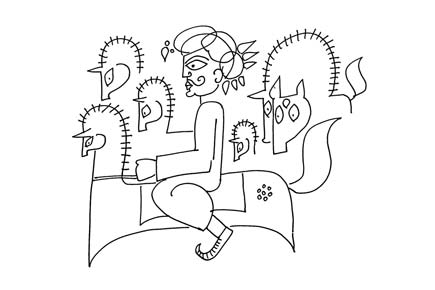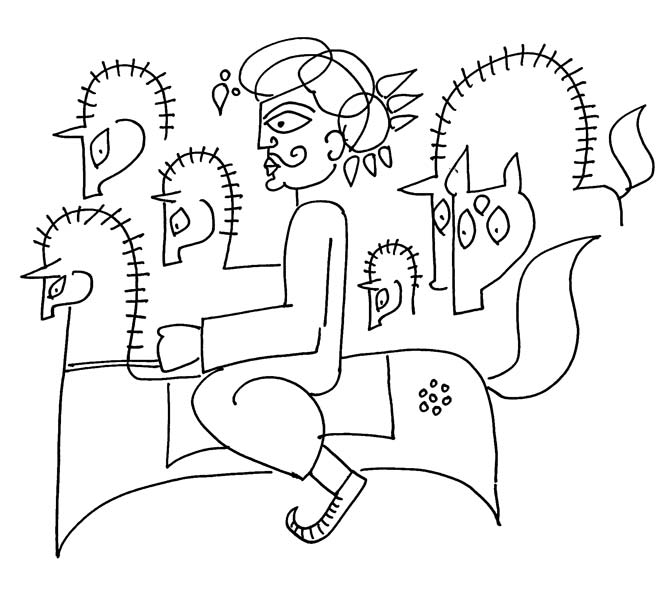My friend told me of a ritual practice in some parts of rural Rajasthan. When the marriage party is passing a shrine of Momaji, people offer lamps (usually in a dry coconut), food (wheat) and other indulgences (beedi is common)


Illustration/Devdutt Pattanaik
ADVERTISEMENT
 My friend told me of a ritual practice in some parts of rural Rajasthan. When the marriage party is passing a shrine of Momaji, people offer lamps (usually in a dry coconut), food (wheat) and other indulgences (beedi is common). Mamoji is represented as horse-riding heroes. The shrine, usually open air, under a tree mostly, comprises of many images of majestic warriors on horses. Not much is known about them. Stories are about heroes accompanying sisters or brides to their husband’s house, fighting demons and dacoits. It is clearly part of the folk religion of Rajasthan.
My friend told me of a ritual practice in some parts of rural Rajasthan. When the marriage party is passing a shrine of Momaji, people offer lamps (usually in a dry coconut), food (wheat) and other indulgences (beedi is common). Mamoji is represented as horse-riding heroes. The shrine, usually open air, under a tree mostly, comprises of many images of majestic warriors on horses. Not much is known about them. Stories are about heroes accompanying sisters or brides to their husband’s house, fighting demons and dacoits. It is clearly part of the folk religion of Rajasthan.
Such horse-riding deities are a common part of local culture in India. In Gujarat, in Kutch, is the shrine of the Jakh Botera, or the 72 horse-riding ‘yaksha’ warriors. Again, not much is known about them, accept that they have helped those who worship them with fertility and protection. The temple is crowded with images of horse-riding warriors. The Jakh Botera have one sister, Sayari, a mirroring of yogini and matrika shrines, where the female collective has one male, the Bhairava. Fairs are held in the honour of this divine cavalary.
Horse-riding deities who get terracotta horses as votive offerings are part of Tamil Nadu folk religion too. As one travels the countryside, one sees gigantic images of horse-riding warriors. In Odisha, in Jagannath Puri temple, one of the famous images is of a fair-skinned warrior on a black horse and a dark-skinned warrior on a white horse, representing Shiva and Vishnu, or Balarama and Krishna. In Maharashtra and Deccan region, the most popular regional god is Khandoba or Mallana, who rides a white horse, and battles demons, accompanied by his wife, who rides with him on the same horse.
Khandoba is considered a form of Shiva. In the Puranas, Vishnu’s horse-riding avatar is called Kalki. We don’t hear anything about Ram or Krishna riding horses. The other horse-riding deities include the Ashwin twins, who father Nakula and Sahadeva, also associated with horses. The god of riders is Revanta, the son of Indra.
The horse is not native to India. The monsoon weather seems to not suit them. It was constantly imported to India from the North West. The one horse that is a local breed is the Marwari horse bred by Rajputs. In Vedic times, there is greater reference to gods who travel on carts and chariots pulled by horses. Horse-riding as a concept is more associated with warriors who invaded India — the Greeks, the Huns, the Gujars, the Scythians or Sakas, and finally the Central Asian warlords like Turks and Mughals, all grouped together in local literature as ‘Yavana’ — fair skinned men in their horses.
Perhaps, over time, they were revered for their strength. They were seen as mercenaries who, on payment of a fee, protected the village from others like them. They became part of folk memory and folklore, to be enshrined in temples on wayside. They became guardian gods, such as Mamoji and Jakh Botera, popular enough to appear in temple lore and even in Puranas, as the final avatar, Kalki of Vishnu, who will destroy the old order and force change: the creation of a new order.
The author writes and lectures on the relevance of mythology in modern times. Reach him at devdutt@devdutt.com
 Subscribe today by clicking the link and stay updated with the latest news!" Click here!
Subscribe today by clicking the link and stay updated with the latest news!" Click here!






